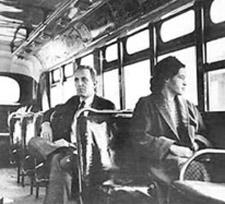Rosa Parks, 1913-2005

On December 1, 1955 in Montgomery, Alabama, a petite, unassuming 42-year old African-American department store seamstress named Rosa Parks boarded a public bus and sat down in one of the first 10 seats -- which were reserved for white passengers regardless of whether there were any. Moments later, the bus driver asked her to give up her seat for a white male passenger. When she refused, the driver said that he would have her arrested. "You may go on and do so," she calmly replied.
Parks later said she was tired and weary after a long day's work, but that was shorthand for her greater exhaustion from the racism and segregationist policies of the American South. Her quiet protest marked the beginning of the civil rights movement that caught fire in the U.S. through the early 1970s, giving momentum to the careers of Martin Luther King, Jr., Medgar Evers, Fannie Lou Hamer and countless others; but while it was a milestone in American history, for Rosa Parks it was just another act in a long career of commitment to civil rights. She passed away yesterday.
Born in poverty on February 4, 1913 in Tuskegee, Alabama, at age 11 Rosa McCauley entered the Montgomery Industrial School for Girls, a school founded by Northern liberals which promoted self-worth among its students, and later moved on to study at the Alabama State Teachers College. In 1932, she married Raymond Parks, a barber who was active in African-American voter registration.
During the next 20 years, while working as a seamstress or clerk here and there, Rosa Parks became an active participant the local NAACP, ultimately as secretary and youth advisor for the Montgomery branch (1943-56), where she anonymously helped victims of "flogging, peonage, murder and rape."
Dissatisfaction within the Montgomery African-American community, which represented about 42% of the population of the city and about 70% of the ridership of the city bus lines, had been building for some time by April 1955, when an African-American teenager named Claudette Colvin was arrested for refusing to give up her seat on a bus. Montgomery civil rights leaders decided not to pursue Colvin's case as their test of segregation, given her age (15) and the fact that she was an unwed mother-to-be, and similarly passed on the case of 18-year old Mary Louise Smith, who was arrested in October. When Parks took her stand in December, it was a surprise to her colleagues, but she was immediately seen as the ideal protagonist for the cause: married, middle-aged, employed, sweet and demure, but nonetheless possessed of a strong will and a superior sense of the politics of her situation. "My God," exclaimed local activist E.D. Nixon, "look what segregation has put in my hands!"
The local Women's Political Council almost immediately initiated a one-day bus boycott, after which local activists formed the Montgomery Improvement Association and elected 26-year old Baptist pastor Martin King as their leader. With boycott extended, the bus lines began to lose money, and the white city commissioners and their hooligan-supporters resorted to harassment of African-American carpools and pedestrians to get the activists to drop their mission. A number of the boycotters, including Parks and her husband, lost their jobs in the fray; King's home was bombed; and a court order barred the NAACP from operating in Alabama. In February 1956, however, civil rights lawyer Fred Gray filed a federal suit challenging segregated transportation, and was successful in having it declared unconstitutional, a ruling which was upheld by the U.S. Supreme Court. Under an order served by U.S. marshals, after 382 days of the Montgomery bus boycott, the buses were finally desegregated on December 20, 1956.
Parks was thankful for the result, but noted that there was much more work to be done. Parks moved to Detroit, and despite her own sufferings and losses as a result of the episode (hospitalization for stomach ulcers, a period of joblessness, her husband's nervous breakdown), she campaigned tirelessly on behalf of the cause, raising funds for the NAACP. From 1965 until her retirement in 1988, she ran the Detroit office of Democratic congressman John Conyers and maintained her presence as a community activist for jobs and cultural issues. In August 1994, Parks was the victim of a robbery and assault in her home. In 1999, however, she showed that she still had plenty of fight left in her when (ultimately with the help of attorney Johnnie Cochran) she sued the rap act OutKast over the misappropriation of her name for the title of their Grammy-nominated song "Rosa Parks"; a federal court eventually ruled that OutKast's song title was protected by the First Amendment.
Much decorated, she became an elder statesperson of the civil rights movement, still determined to drive home her points. When the elder George Bush mistakenly referred to Birmingham as the site of the bus boycott during her appearance at a White House ceremony in 1989, she later commented, "Instead of having better ceremonies, we need better programs" for the poor and disenfranchised.
Labels: Civil Rights, Trailblazing Women





1 Comments:
Too bad the Nashua, New Hampshire women who run the NAACP office have none of the heart and sould of Rosa Parks; they sell out for The Man and try to limit my First Amendment Rights to protest their actions:
See
http://christopher-king.blogspot.com/2005/11/king-5-0-in-first-amendment-cases.html
Peace.
Post a Comment
Subscribe to Post Comments [Atom]
<< Home